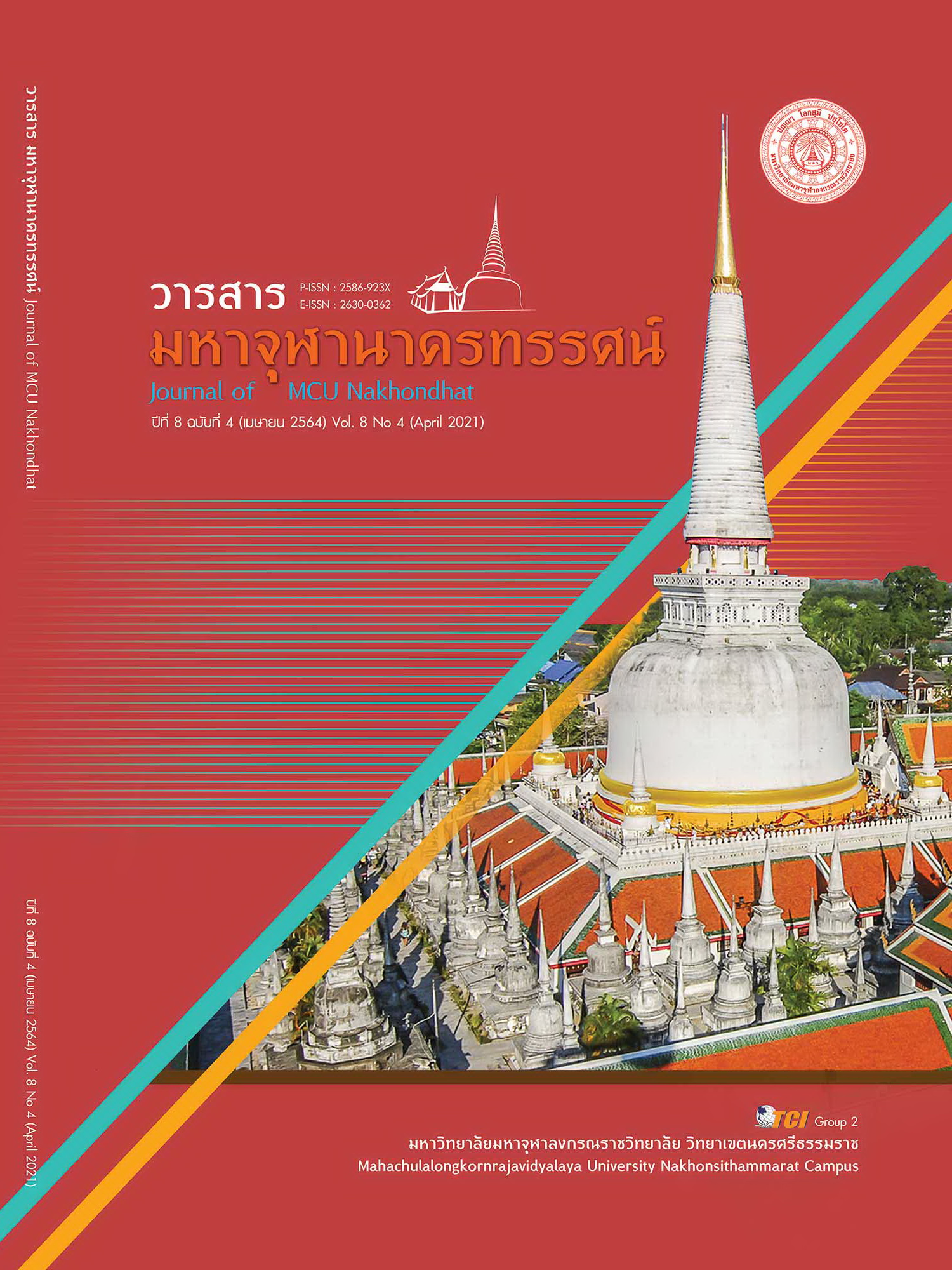PAPAÑCA-DHAMMA : PROBLEMS AND SOLUTIONS IN INTEGRATED BUDDHIST PERSPECTIVE
Main Article Content
Abstract
The objectives of this research article were to 1) study the principle of Papañcadhamma in light of Abhidhamma, 2) study the state of problems caused by Papañcadhamma and its solution, and 3) propose the integrated Buddhist solution to the problems caused by Papañcadhamma. This is a qualitative research done by studying documents and field research by in - depth interview of six Buddhist scholars and then the analysis and synthesis of its contents were made by descriptive methodology. The research results were found that: 1) according to Abhidhamma, Papañcadhamma belongs to the unwholesome mental properties, which comprises of three mental factors: craving, conceit and wrong view; they are conditioned by one another and thereby causing problems, 2) the states of problem caused by such craving refer to the over - consumption and household debt, the competitiveness for power and the exercise of such power to mercilessly brings about the violence, be it individual or structural violence, the wrong view on such problems, and 3) in the Buddhist integrated formation for solving problems caused by such craving based on E - F - Q Model, it was proposed by this research as follows: 3.1) the problem caused by craving should be solved through the principle of the principle Equilibrium of life, the moderation (Mattaññutã),gain for this life (Diṭṭhadhammikattha), wisdom (Satisampajañña), and precept (Sĩla). Apart from that it should be developed by the process of inspiration and awareness of its advantage and disadvantage, 3.2) what is caused by conceit should be solved through the Buddhist social fraternity, mental and ethical principles, namely, six kinds of conciliation, being amiable in deeds, words, thought, sharing any lawful gain with virtuous fellows, keeping without blemish the rules of conduct along with one’s fellows, and being endowed with right views along with one’s fellows where the realization of the advantage and disadvantage could be actualized, and 3.3) the problems caused by wrong view should be solved through the principle of the Quality of life whereby the awareness and self - realization in accordance with the Buddhist principles based on the building of right view.
Article Details
References
ศรีสมภพ จิตร์ภิรมย์ศรี. (2563). สัญญาณอันตราย: ความรุนแรงเชิงโครงสร้างสู่ความรุนแรงเชิงวัฒนธรรมของสังคมไทย. เรียกใช้เมื่อ 20 พฤษภาคม 2563 จาก https://www.the101.world/structural-and-cultural-violence/
สรา ชื่นโชคสันต์. (2562). 8 ข้อเท็จจริง ปัญหาการเงินของครัวเรือนไทย ธนาคารแห่งประเทศไทย. เรียกใช้เมื่อ 10 กรกฎาคม 2563 จาก https://www.bot.or.th/Thai/ResearchAndPublications/articles/Pages/Article_30Oct2019.aspx
ธรรมวลี ศรีแช่ม. (2553). การศึกษาปปัญจธรรมในพระพุทธศาสนาเถรวาท. ใน วิทยานิพนธ์พุทธศาสตรมหาบัณฑิต สาขาพระพุทธศาสนา. มหาวิทยาลัยมหาจุฬาลงกรณราชวิทยาลัย.
ไกรสิทธิ์ นฤขัตพิชัย. (2553). จิตแพทย์แนะวิธีอยู่อย่างเข้มแข็งในสังคมที่แข่งขัน, สำนักงานกองทุนสนับสนุนการสร้างเสริมสุขภาพ. เรียกใช้เมื่อ 15 กรกฎาคม 2563 จาก https://www.thairath.co.th/lifestyle/woman/56905
บุญธรรม พูนทรัพย์. (2533). ศีลธรรมกับสิทธิมนุษยชนในพุทธปรัชญาเถรวาท. กรุงเทพมหานคร: จุฬาลงกรณ์มหาวิทยาลัย.
พระปลัดวิสุทธิ์ คุตตชโย. (2555). คู่มือการศึกษาพระอภิธรรมชั้นจูฬอาภิธรรมมิกะตรี. กรุงเทพมหานคร: หจก.ทิพย์วิสุทธิ์.
พระพรหมคุณาภรณ์ (ป.อ.ปยุตฺโต). (2556). พุทธธรรม ฉบับปรับขยาย. กรุงเทพมหานคร: สำนักพิมพ์แพ็ทแอนด์โฮม.
พระไพศาล วิสาโล. (2561). เศรษฐศาสตร์แนวพุทธ วิถีบริโภคเพื่อความสุขที่ยั่งยืน. BOT พระสยาม MAGAZINE, 7(1), 25-31.
พระมหาสมบูรณ์ วุฑฺฒิกโร. (2544). ทิฏฐิ : ความเห็นความเชื่อที่ชี้นำชีวิตและสังคม. ใน วิทยานิพนธ์ศิลปศาสตรมหาบัณฑิต สาขาพุทธศาสนศึกษา. มหาวิทยาลัยธรรมศาสตร์.
ภรณี ลีนุตพงษ์. (2556). ปรัชญาของเศรษฐกิจพอเพียงกับการพัฒนาประเทศ, หลักสูตรหลักนิติธรรมเพื่อประชาธิปไตย รุ่นที่ 1 ปี 2556 วิทยาลัยรัฐธรรมนูญ สำนักงานศาลรัฐธรรมนูญ. เรียกใช้เมื่อ 20 กรกฎาคม 2563 จาก https://institute.constitutionalcourt.or.th/occ_web/ewt_dl_link.php?nid=1238
มหาจุฬาลงกรณราชวิทยาลัย. (2539). พระไตรปิฎกฉบับภาษาไทย ฉบับมหาจุฬาลงกรณราชวิทยาลัย. กรุงเทพมหานคร: โรงพิมพ์มหาจุฬาลงกรณราชวิทยาลัย.
สุเชาว์ พลอยชุม. (16 มีนาคม 2563). หลักธรรมประยุกต์ใช้ในการแก้ไขปัญหาที่มีสาเหตุจากปปัญจธรรม. (อัญชฎา พูลทัศฐาน, ผู้สัมภาษณ์)
สิทธิพร อารมณ์สุขโข. (2561). การบูรณาการหลักพระพุทธศาสนากับศาสตร์บริหารจัดการชีวิตในสังคมไทย. ใน ดุษฎีนิพนธ์พุทธศาสตรดุษฎีบัณฑิต สาขาพระพุทธศาสนา. มหาวิทยาลัยมหาจุฬาลงกรณราชวิทยาลัย.
สุนันทา เรียงแหลม. (2551). การศึกษาวิธีการแก้ปัญหาเรื่องความโลภในสังคมปัจจุบันตามหลักพระพุทธศาสนาเถรวาท. ใน วิทยานิพนธ์พุทธศาสตรมหาบัณฑิต สาขาพระพุทธศาสนา. มหาวิทยาลัยมหาจุฬาลงกรณราชวิทยาลัย.
Schultz, P. D. & Schultz, E. S. (2009). Theories of Personalities. Ten Edition. United State of America: ISBN.


